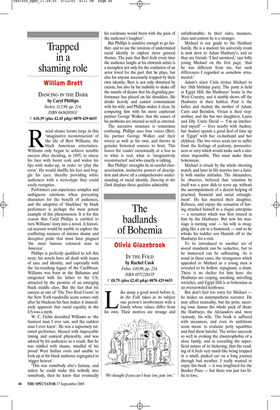The badlands of Bohemia
Olivia Glazebrook
IN THE FOLD by Rachel Cusk Faber, £10.99, pp. 224, ISBN 0571228135 ✆ £8.79 (plus £2.45 p&p) 0870 429 6655 Like many a good novel before it, In the Fold takes as its subject one person’s involvement with a family whose values differ from his own. Their motives are strange and unfathomable; to their rules, manners, class and context he is a stranger.
Michael is our guide to the Hanbury family. He is a student; his university room is next door to Adam Hanbury’s, and so they are friends. ‘I had surmised,’ says lofty young Michael on the first page, ‘that he was different from me, but such differences I regarded as somehow ornamental.’ Adam’s sister Caris invites Michael to her 18th birthday party. The party is held at Egypt Hill, the Hanburys’ home in the West Country, and it nimbly shows off the Hanburys in their habitat. Paul is the father and Audrey the mother of Adam, Caris and Brendon. Vivian is their stepmother, and she has two daughters, Laura and Jilly. Uncle David — ‘I’m an intellectual myself’ — lives nearby with Audrey, but Audrey spends a good deal of time up at ‘Egypt’ with her ex-husband and her children. The two wives seem not to suffer from the feelings of jealousy, possessiveness or envy which would make such a situation impossible. This must make them bohemians.
Michael is struck by the whole shooting match, and later in life marries into a family with similar attitudes. The Alexanders, he observes, believed that ‘emotion by itself was a poor dish to serve up, without the accompaniment of a decent helping of practical, financial and social entanglement’. He has married their daughter, Rebecca, and enjoys the sensation of having attached himself to a risqué enterprise — a sensation which was first roused in him by the Hanburys. But now his marriage is turning sour — his wife is struggling like a cat in a hammock — and so he whisks his toddler son Hamish off to the Hanburys for a visit.
To be introduced to another set of moral standards can be seductive, but to be immersed can be suffocating. As is usual in these cases, the strangeness which appealed to Michael as a young man is revealed to be hollow, repugnant, a sham. There is no shelter for him here: the Hanburys are carping, sneaking, snivelling wretches, and Egypt Hill is as bohemian as an overcrowded henhouse.
But don’t feel too sorry for Michael he makes an unsympathetic narrator. He may affect neutrality, but his prim, sneering tone damns the whole pack of them: the Hanburys, the Alexanders and, most viciously, his wife. The book is suffused with meanness, and even its ambitions seem mean: to evaluate petty squabbles and find them hateful. The writer succeeds so well in evoking the claustrophobia of a close family, and in recording the superficial nature of its bickering, that the reading of it feels very much like being trapped in a small, packed car on a long journey through bad weather. I really wanted to enjoy this book — it was longlisted for the Booker Prize — but there was just too little to love.



















































 Previous page
Previous page